#wu zhiqi
Text
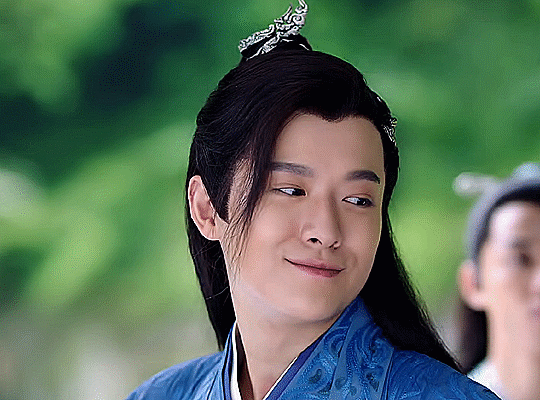
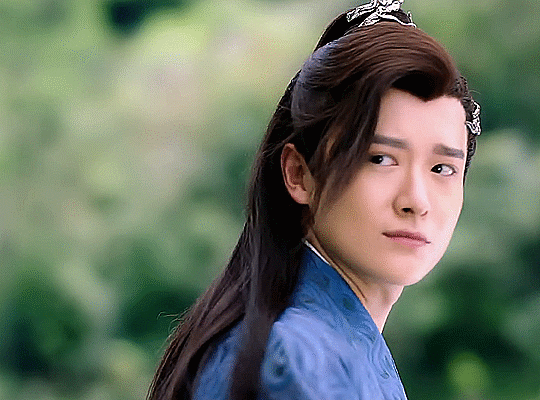
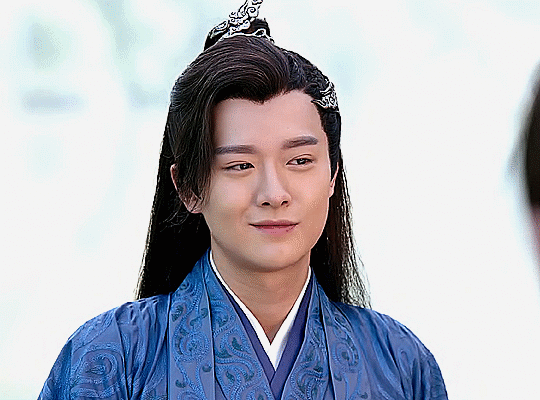
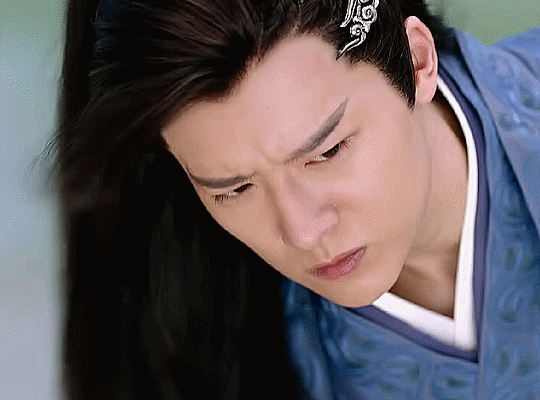
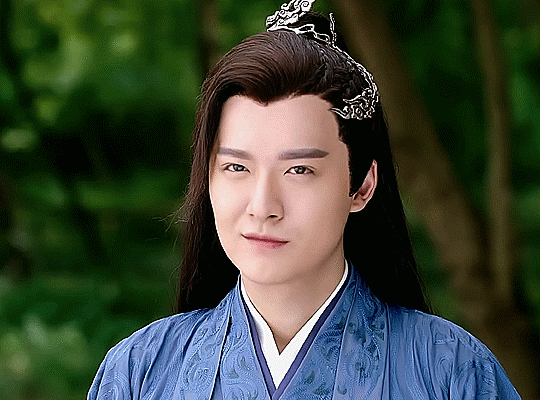
Wu Zhiqi | Love and Redemption ep. 57
#love and redemption#wu zhiqi#fu fangjun#my edit#cdrama#gif#he was so baby in this ep (for a stinky monkey :))))
28 notes
·
View notes
Note
so i did a deep dive today for this thank you for the new headcanon
i’m thinking yuán as in 猿 - 犭 = 袁
ape - animal radical = long cloth
like how 猻 - 犭 = 孫 = 孙 (simplified)
猻 is from 猴猻 hóusūn which means monkey
monkey - animal radical = grandson
孙悟空 • sūn wùkōng • grandson awakened to nothingness
袁巫支祁 • yuán wūzhīqí • long cloth great shaman/witch/sorcerer/wizard to support/bear/sustain
if you look at old chinese paintings of gibbons, they look like they have black bodies and white heads
btw i high recommend an evaluation of robert van gulik’s the gibbon in china and its place in modern sinological discourse on the academia app. it’s free and ripe with information about how gibbons were viewed and depicted in ancient china. robert’s book is damn expensive tho. i envy anyone who has their hands on it.
here’s an excerpt that surprised me:
The third theme is suggested in the following: “The gibbon is better than the monkey , the former is clean, gentle and recluse, the latter is dirty, noisy, greedy and vulgar” (“Mei yuan su hou”美猿俗猴) (TGIC 58). RvG thought this idea was pragmatic. Ancient Chinese literati like Wu Yun (“Poem of the Black Gibbon”) (TGIC 54-56), Li Deyu (“Poem of the White Gibbon) (TGIC 56-57), and Liu Zongyuan 柳完元 (773–819)21 (“Essay on the Hateful Monkey-breed” or “Zeng wangsun wen” 憎王孙文) (TGIC 54-56). Each compared the quarrelsome and volatile monkey with the aloof gibbon (TGIC 56). The lament is evidently directed against the people at court who caused their patron’s downfall (TGIC 57). Wu Yün, Li Deyu and Liu Zongyuan contrasted the violent and vulgar monkey with the high-minded and well-behaved gibbon. So the monkey is described as greedy, cruel and undependable, and ugly in appearance” (TGIC 57).
oh and the novel calls wūzhīqí great sage water ape… they were totally born from water. water egg? water womb?
and since it’s semi-popular in lmk fandom to make six-eared macaque a wind monkey due to the macaque king, that would leave red-buttocked horse monkey a fire monkey. red is the color of fire and the horse’s element is fire. in buddhism there are 4 great elements: earth, water, fire, and air so it all weirdly fits.
Oh damn you did such an AMAZING deep dive in both the language and history!! I adore it!!
I am aware the theory that Macaque King is the Six Ears is a common theory and with that the tie in with being the Great Sage of Ventilation, not just in LMK.
It would be cool if the Spiritual Primates had a connection to the elements, even if it is not the five. I actually forget that Buddism had its own elements that are technical since I always counted akasa/space.
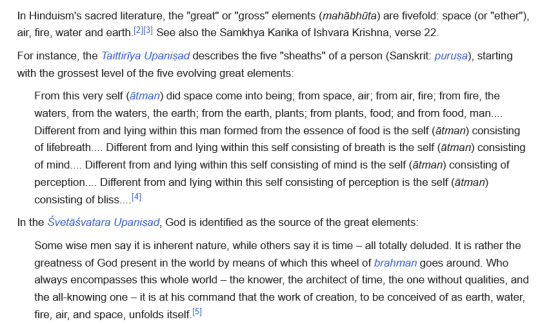
But perhaps if the idea that each primate is also birthed from inanimate objects perhaps something like
Stone - Wukong
Pearl - Wuzhiqi / Gibbon
Magma - Baboon
Tree Root - Macaque (since air is also connected to wood in Chinese lore)
If they were ever to use the Gibbon as either the same Wuzhiqi from the Yuan Xiyouji she would be an amazing addition, or perhaps they could have used the Sage leaning background as well. In either case, there's so much history when it comes to both primate lore that I really think there can be a lot done with these findings
#anonymous#anon#jttw#anon ask#journey to the west#xiyouji#primordial primates#spiritual monkeys#celestial monkeys#fantastic read you suggested!#I hope I can get on that soon!#wuzhiqi#wu zhiqi#red bottom baboon#red bottom mandrill#red bottom horse monkey#long armed gibbon#bare armed gibbon#six eared macaque#ask
84 notes
·
View notes
Photo

Insp
#love and redemption#Yuan Lang#wu zhiqi#bai ling#teng she#wu tong#lize palace chief#love and redemption meme
43 notes
·
View notes
Text
Best character surnamed: Wu
Come and vote for the best characters with the same surname!*
What does best mean? It's up to you! Whether you love them, are intrigued by their characters, love to hate them, or they're your '2 second blorbos whose personality you made up wholesale', these are all reasons for you to vote for your favs!
*note, the surnames are not exactly the same in all the cases, as often there will be a different character. I am, however, grouping them all together otherwise things got more complicated.
Propaganda is very welcome! If I’ve forgot anyone, let me know in the notes.
This is part of a larger series of ‘best character with X surname’ polls’. The overview with ongoing polls, winners, and future polls can be found here
#poll#legend of fei#qi ye#dmbj#love and redemption#the king's avatar#detective l#the blooms at ruyi pavilion#blood of youth#iron widow
52 notes
·
View notes
Text
LHJD appreciation post (and some headcanon)
So Luohou Jidu, one most under-valued character in the show. Not that the show didn't demonstrate his very awesome full range, but we didn’t get to see him much before the current events, what’s he really like without all that revenge. In the demon’s realm his title was “the respected/revered one”. Not “the feared one” mind you. And Wu Zhiqi, in Zihu’s words ‘the most free, big-hearted person in the world’ admits that among all of the Shuras he admires Luohou Jidu the most. That must count for something. And considering he didn’t overthrow King Shura when he easily could, if he wanted, Luohou Jidu was not motivated by power, even if he have abundant.
Major spoilers and some images below.

It was said in the novel he wanted to become a woman(before that choice was stole away by the real villain and twisted so horribly that he hated being called his chosen female name). In the show this was not mentioned. I don’t like to think that he wanted to become a woman just to be better accepted to love men, that’s too narrow. Instead, I want to give him some back story, where this decision has more to do with his culture and his self-actualization. So Luohou Jidu did not choose to be female because he feels he had to, but because he decided to. It was said that in the novel his people were initially all born with a male form due to their aggressive nature and the wrath energy they control, but could choose their gender as they reached adulthood. I’d like to think Luohou Jidu would choose to turn female mainly because of his own thoughts, nature and aspirations, because being female is considered as much more difficult but a higher choice, something to aspire to, and very few could manage it. I’d like to think for his people being female is not only not ‘less’ but ‘more’, a way to expand your being and ability, because it’d be especially difficult for those who naturally wield the wrath energy to reconcile that with femininity. Most wouldn’t even bother because they enjoy being males more anyway. So Luohou Jidu’s choice would still be unusual, but not completely shocking among his folks.

Besides, becoming female does not mean being submissive—it’s obvious who tops and who bottoms between Xuanji and Sifeng. There was also none of that female must be mild bullcrap involved. Instead, being female probably means not just able to strike but also protect, to have an ability of gentleness on top of their fierce nature. From the beginning it is shown that Xuanji has strong instinct to protect others and be just, so it’d be natural to assume this is also true for Luohou Jidu. He was not a simple brute who is just a vehicle to carry out some of fic writers’ fantasies.
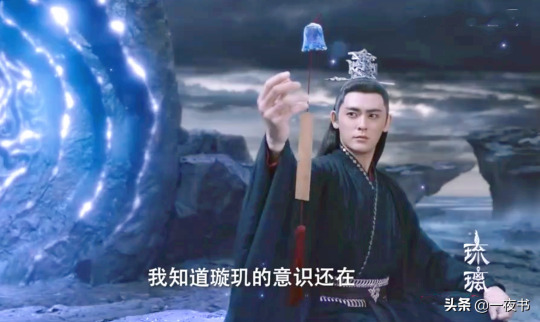
I like how there was superposition and wholeness in the show. LHJD was very comfortable in his maleness, as Xuanji/God of War was comfortable in her femaleness. It speaks to the truth that human nature cannot be constrained by gender norms expected from society. A very capable mind would naturally shrug off such artificial constrictions. I’d like to think a more capable mind can instead enjoy such artificial constructions and be more. And I think this is one of the reason I really like Xuanji/Luohou Jidu being the same being, but in different manifestations. We can see that Luohou Jidu is a more unrestrained version of Xuanji/God of War and Xuanji as a more happy and agreeable version of Luohou Jidu. Yet they would both fall in love with Sifeng and let themself be anchored to the mortal world because of that love.

22 notes
·
View notes
Text


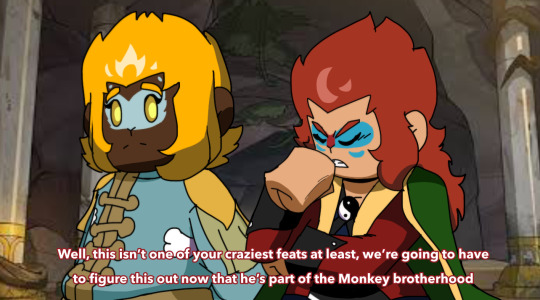
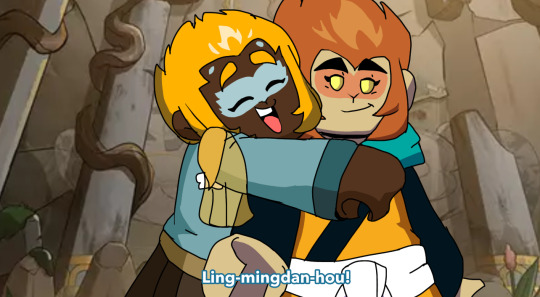
Designs for the Red Horse Monkey and the Long-Armed Gibbon.
Adding them to a few AUs and making a whole ass AU centered around them. I might make a MasterPost one day, but now’s not the time.
Won’t explain it too much, I might spam this acc a bit…
‘The Monkey Brotherhood’ have multiple names for each other so that when one is speaking about the group, no one can really tell who they’re talking about.
Sun Wukong
-Mei Houwang: Handsome Monkey King
-Bimawen: Keeper of the Heavenly Stables
-Sun-xingzhe: His Monk title when Sanzang accepted him as his companion (Also for used aesthetic)
-Dou-zhansheng-fo: Victorious Fighting Buddha
-Ling-mingdan-hou: Intelligent Stone Monkey
-Sun Zhanglao: Honorific for a monk.
-Lingming Shihou: Stone Monkey of Numinous Wisdom
Six-Eared Macaque
-LiuEr Mihou: Basically his name in Chinese. (Since LMK doesn’t use Chinese translation for the name like Macaque’s name)
-Mihou Wang: Macaque King (This is a reference to JTTW’s original Macaque King, it references the original sworn brotherhood)
-Tongfeng dasheng: The Great Sage Informing Wind.
-Fa Bu Zhuan Liu Er: Law does not pass to the Six Ears/the third pair or person/there is no third party [sixth ear] present.
-Waidao Pangmen: Side door-for someone who eavesdrops in secrets.
Red-Buttocked Horse Monkey
-Chikao mahou: his name in Chinese, they actually refer to this name more.
-Wu Zhiqi: A name given by The Spiritual Attainment of Minghe Novel also it is a name given by Shan Hai Jing Records (I was running out of names since Red has no information on him unfortunately)
-Chikao Dasheng: I tried to combine the name ‘Great Sage’ and Chikao which means wise. (Probably Wukong being stupid)
-Dasheng zhihui Zhi she: I had to make up a title, and thus came up with ‘The Great Sage Wisdom’s Tongue’
Long-Armed Gibbon/Ape.
-Tongbei Yuanhou: Name in Chinese, usually referred this way.
(I don’t have other names, I just need to find a lot of things)
#lego monkie kid#lmk#lmk au#lmk sun wukong#lmk monkey king#monkie kid#lmk macaque#lmk six eared macaque#journey to the west#jttw au
35 notes
·
View notes
Note
Jiaozi is a character from the "journey to the west" of the yuan zaju dynasty, daughter of king huolun jinding and wife of sun wukong, the great sage of tongtian. Sun wukong once said, "I stole fairy clothes, fairy hats, fairy peaches and fairy wine in my heavenly palace. My wife will happily enjoy them." So jiaozi is not only sun wukong's wife also is the mother of his children. Jidu and luohou and daughter yuebei. The eclipses twins and the moon star comet
@maidenofthecloud hmmmm apologies if I'm missing something but as far as I knew "Jiaozi" is just a kind of dumpling (X_X). HOWEVER, this could very well just be due to my own ignorance and the fact that I've never encountered an English translation of the Zaju Xiyou Ji. If you have the link to one please share it!
As it is pretty much all my knowledge of that play comes from the scholar Hongmei Sun's overview of different versions of the the Monkey King throughout the centuries. Here's a few things she has to say on this earlier version of the westward journey:
"The six-part, twenty-four-act Zaju Xiyou ji is attributed to the fourteenth-century playwright Yang Jingxian, who lived during the late Yuan and early Ming periods. In the few hundred years between Shihua [an even earlier version] and Zaju, the story of ‘Journey to the West’ is not only more expanded, containing many of the stories that can be found later in Journey to the West, but the monkey figure in Zaju has grown into a character strikingly different from Hou Xingzhe [the monk's faithful companion in Shihua]. If Hou Xingzhe in Shihua is depicted as an advisor for Tripitaka, as respectable albeit mysterious deity, and a brave fighter, the monkey in Zaju is pictured as a rowdy clown, an untamed demon and ill-qualified Buddhist disciple.
The monkey’s name in Zaju now is almost the same as in the sixteenth-century fiction Journey to the West. He refers to himself as ‘Tongtian Dasheng’ (Great Sage Reaching Heaven), only one word’s difference from ‘Qitian Dasheng,’ the title Sun Wukong receives from the Taoist heaven in the sixteenth-century book. In some versions of the Monkey King story, including the Zaju, Qitian Dasheng and Tongtian Dasheng are brothers…
Although Tongtian Dasheng is the monkey’s title, in the drama everyone calls him ‘the monkey’ (husun), including Guanyin, even though she is the person who gave him the names Sun Wukong and Sun Xingzhe (Acolyte). When Guanyin presents Sun Xingzhe to Tripitaka as his disciple, she gives the monkey an iron fillet, a cassock, and a knife….Even with the headband’s control, Tongtian Dasheng’s behavior and language indicate that his mind remains that of an irreverent demon.
As in the zaju theater tradition, Sun Xingzhe introduces himself to the audience with a poem at his first appearance. Vaunting his celestial birth, his power, and the troubles he could create, in colloquial expression rather than elegant traditional terms as others’ opening poems, the monkey’s poem describes himself as a celebrated ape demon, referring to himself as the King of a Hundred Thousand Demons. In the following statement he introduces himself and his four siblings as his demon family: His elder brother Quitian Dasheng, a younger brother Shuashua Sanlang, and two sisters, Lishan Laomu and Wu Zhiqi Shengmu. This genealogy of the monkey shows that Sun Xingzhe in Zaju is already much more localized, settled into the local religious/cult culture. Unlike the monkey in other versions, this one has a wife, the abducted princess of the Country of the Golden Cauldron. He also proudly reports to the audience his famous misdeeds, which is also the reason that heaven is after him: he has stolen the Jade Emperor’s celestial wine, Laozi’s golden elixir, and the Queen of the West’s (Xichi Wangmu) peaches and fairy clothes. He also makes upfront ribald references about himself in this very first speech. The monkey’s demonic heart is indicated by his intention to eat Tripitaka immediately after Tripitaka rescues him from beneath the mountain. He never shows any seriousness about his business of pilgrimage, and his behavior does not improve during the journey. When the team arrives in India, he uses crude language in a conversation with an old lady about Buddhis ideas of the ‘heart.’”
---
@journeytothewestresearch also writes that in Zaju Xiyou Ji the princess is eventually freed from her forced marriage to this monkey by Heavenly King Li Jing (Li Nezha's father) and the Bodhisattva Guanyin. Here Sun Xingzhe/Sun Wukong definitely bares more similarity to magically powerful and sexually violent monkeys in other stories from Chinese folklore! And that remains true even though the quote you provided makes it sound like he wants the princess to enjoy nice things.
So given these literary and historical circumstances, especially with Jidu, Louhou, and Yuebei Xing not appearing until the 17th century Journey to the South, it might be a stretch to say that the princess of the Country of the Golden Cauldron is a likely candidate to be their mom. This is especially true since as far as I'm aware there's no mention of Sun Xingzhe and the princess having any kids, or even of her being pregnant...ON THE OTHER HAND, it must be acknowledged that she might also be the best candidate given that no mom is mentioned in Journey to the South and that there is a historical precedent for her being Sun Wukong/Sun Xingzhe's wife for awhile. If that narrative thread is followed then it might mean Jidu, Luohou, and Yuebei Xing have more than one similarity to the children of the Yellow Robe Demon, who also kidnapped a princess and had two children with her. In that situation I'd actually hope that she isn't their mom, given that that would make Sun Wukong a rapist and them the product of a forced marriage. ON THE OTHER OTHER HAND, given that the Monkey King's characterization and many aspects of his history from Journey to the West and Journey to the South (as far as I know lmao) is so different from Sun Xingzhe's in Zaju Xiyou Ji , and that all of this comes from folkloric roots in which stories are very different from region to region and even one year to the next, I could see there being an argument made for bringing her into the more recent continuations of Xiyouji as Sun Wukong's wife and the mother of his children while the rapey aspect of the earlier version of their relationship is dropped for something more loving or at least consensual. So even with my ignorance on what precisely happens in Zaju Xiyou Ji and Journey to the South, it seems like as with Xiyouji itself there's a lot you could potentially do with "the princess of the Country of the Golden Cauldron is Jidu, Louhou, and Yuebei Xing's mother" idea, from the sweet and loving to the absolute grimdarkest context.
#xiyouji#journey to the west#jttw#zaju xiyou ji#journey to the south#sun wukong#monkey king#princess of the country of the golden cauldron#jidu#louhou#yuebei xing
22 notes
·
View notes
Text
So I kinda of been wondering about something for a bit now, but we know that there are the four monkeys of destruction.
The wise stone monkey
The red-bottomed horse monkey
The long-armed ape monkey
The six-eared macaque
The thing is that as far as I know only two of them have names
Sun Wukong
???
???
Liu Er Mihou
So what are the other two monkeys' names?
(There is one source that says that The red-bottomed horse monkey's name might be Wu Zhiqi, but I haven't found anything that might confirm it as I myself haven't gotten around to reading the books yet)
14 notes
·
View notes
Text
missing wu zhiqi/zihu hours.
0 notes
Note
omg and in the play before the novel wukong had an older sister called holy mother wuzhiqi!
She was! Another good reason to remember the prototype Wukong (Xingzhe) was that he had SIBLINGS.
I always thought how cool it would have been if the celestial primates were inspired by them but considering that Xingzhe had four siblings making them five altogether would be one too many. And that there only seem to be 3 Monkey Sages and Wukong being one of them, making them 1 monkey too few.
The number four really never gets touched... damn.

But if there was a way to combine the lore together it could be that three of his four siblings are actually monkeys (Wuzhiqi Shengmu, Qitian Dasheng, and Shuashua Sanlang) while his first sister is more human in her description in other sources (Lishan Laomu).
If I would have to somehow combine Xingzhe's lore with the Spiritual Primates then I think I would do it something like this.
Great Sage Equaling Heaven (Qitian Dasheng) 齊天大聖 - Changed to Sun Wukong
Great Sage Reaching Heaven (Tongtian Dasheng) 通天大聖, - Six Eared Macaque getting Xinghe's original title, maybe even hinting that he was the turbulent Sun Xingzhe prototype.
Playful Third (?) (Shuashua Sanlang) 耍耍三郎 - Red Bottom Horse Monkey
Holy Mother Wuzhiqi 巫支祇聖母 Wuzhiqi Shengmu- Long Armed Gibbon
I would think that maybe switching Xingzhe's original title with the 齊天大聖 would just highlight how different the Yuan Sun Xingshe and the Ming Sun Wukong were written. Giving a little meta-outlook that perhaps the Yuan tale was inspired by the Six-Eared Macaque all along which for an adaption I would find SUCH a cool reference.
There is a lot that could go into this kind of adaption, especially since there are still other monkey gods that are known about today that could be tied into giving the Primordial Primates some more background and lore, connecting them that they were all once monkeys of legend but eventually lost their prestige through time as their eldest brother overtook the spotlight.
It would just be awesome to give the Primates just more attention in that they had just vague backgrounds I get directors would want to just have fun with them, but having real ties to past Xiyouji adaptions just... would be so meaningful really.
Though another interesting tie-in (and might be more of a stretch) could be giving the other three celestial primates with the Three Monkey Sages.
That kind of adaption could be suggesting that the other three Sages were sticking together and making their own name until one of them gave in and wanted to imitate Sun Wukong.
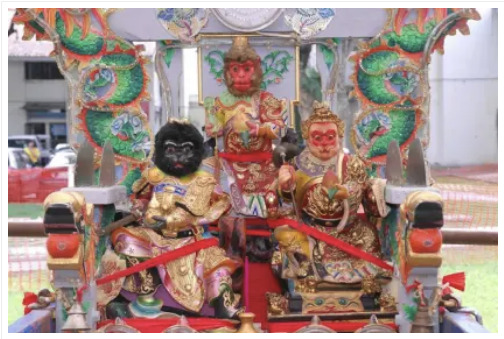
Cinnabar Cloud Great Sage (DanXia DaSheng) 丹霞大圣 - The Red Face Monkey Sage - Six Earred Macaque
Great Sage Reaching Heaven (TongTian DaSheng) 通天大圣- The Black Face Monkey Sage - Long Armed Gibbon
Playful Third ShuaShua SanLang (耍耍三郎) - The White Face Monkey Sage - Red Bottom Horse Monkey
This is more based on the looks and the particular reason that I think that Six Ears being the Cinnabar Cloud Great Sage is better here since the Cinnabar Cloud Great Sage actually DID steal Wukong's identity in the Pacification of the Demons of Linshui 臨水平妖傳. Also, the Black Faced Monkey Sage looks more like a Gibbon and the White Face Monkey Sage looks more like a Baboon to me.
This has made me go on such a tangent but this is all to say that there could be SO MUCH MORE LORE in adaptions given to the primordial primate with how many AWESOME legends there are out there.
#anonymous#anon#jttw#anon ask#journey to the west#xiyouji#celestial primates#celestial monkeys#primordial primates#spiritual monkeys#so much can be done#sun xingzhe#sun wukong#great sage equalling heaven#great sage equal to heaven#wuzhiqi#wu zhiqi#red bottom horse monkey#red bottom baboon#red bottom mandrill#long armed gibbon#bare armed gibbon#six eared macaque#ask
66 notes
·
View notes
Text
0 notes
Photo
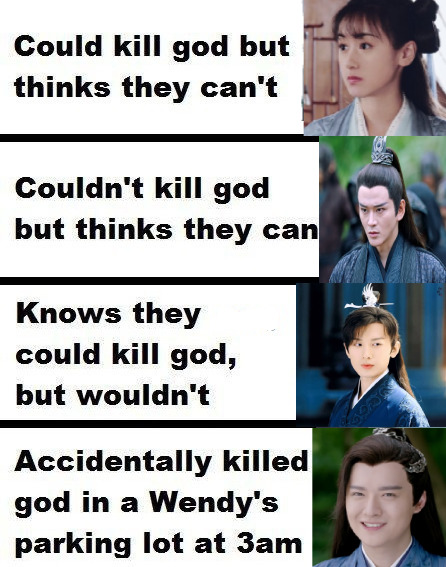
151 notes
·
View notes
Text
Iron Widow Song
#iron widow#wu zetian#books#book#reading#read#wu zhiqi#wu zheng#xiran jay zhao#music#songs#red#bookworm#bookish
9 notes
·
View notes
Photo
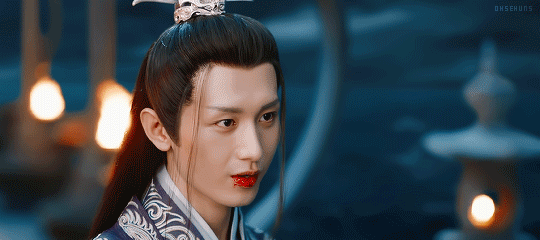
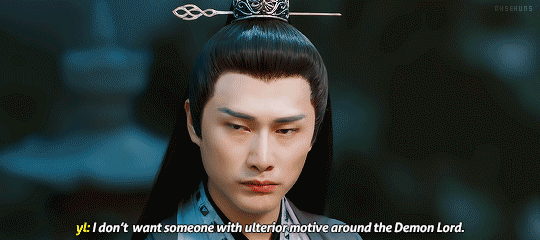
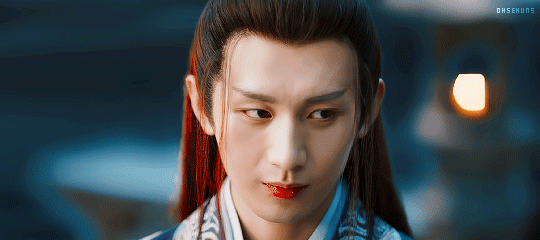
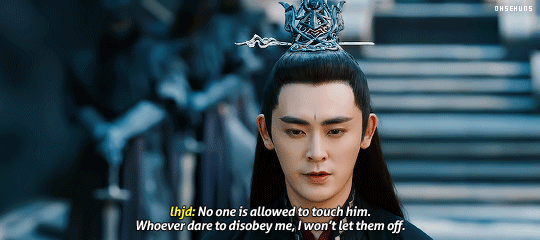
Love and Redemption | "If you dare hurt him, I will take your life.”
#love and redemption#琉璃#cdrama#cheng yi#li xinze#fu fangjun#zhu zixiao#yu sifeng#wu zhiqi#yuan lang#gif#all#gif:cdrama#gif:liuli#this scene cracks me up lmao#yl looks like a mistreated mistress 😂#and wzq got so happy#luohou jidu
310 notes
·
View notes
Note
Did you know that wukong kidnapped the princess of the golden cauldron country and apparently forced her to be his wife, before she’s got saved by nezha and li jing in some play (not in the OG novel) dang who knew he’d be that crazy XD
Happy Sun Wukong Sunday anon, and I do indeed know this. That said, the difference between that proto-Sun Wukong (who goes by the name Sun Xingzhe) and the Monkey King we know and love are so different that they really seem like two completely different characters! The scholar Hongmei Sun provides a really interesting overview of how radically the monkey pilgrim who guards the monk Xuanzang on his journey changed over time, and includes a good summary of what a unserious and sex-obsessed yaoguai the monkey of the play you mention is. I'm including a selection of her words on the matter below (putting in behind a keep reading sign because gosh dern this monkey is crude:
-"The six-part, twenty-four-act Zaju Xiyou ji is attributed to the fourteenth-century playwright Yang Jingxian, who lived during the late Yuan and early Ming periods. In the few hundred years between Shihua and Zaju, the story of ‘Journey to the West’ is not only more expanded, containing many of the stories that can be found later in Journey to the West, but the monkey figure in Zaju has grown into a character strikingly different from Hou Xingzhe. If Hou Xingzhe in Shihua is depicted as an advisor for Tripitaka, as respectable albeit mysterious deity, and a brave fighter, the monkey in Zaju is pictured as a rowdy clown, an untamed demon and ill-qualified Buddhist disciple.
-"The monkey’s name in Zaju now is almost the same as in the sixteenth-century fiction Journey to the West. He refers to himself as ‘Tongtian Dasheng’ (Great Sage Reaching Heaven), only one word’s difference from ‘Qitian Dasheng,’ the title Sun Wukong receives from the Taoist heaven in the sixteenth-century book. In some versions of the Monkey King story, including the Zaju, Qitian Dasheng and Tongtian Dasheng are brothers…”
-“Although Tongtian Dasheng is the monkey’s title, in the drama everyone calls him ‘the monkey’ (husun), including Guanyin, even though she is the person who gave him the names Sun Wukong and Sun Xingzhe (Acolyte). When Guanyin presents Sun Xingzhe to Tripitaka as his disciple, she gives the monkey an iron fillet, a cassock, and a knife….Even with the headband’s control, Tongtian Dasheng’s behavior and language indicate that his mind remains that of an irreverent demon.
-As in the zaju theater tradition, Sun Xingzhe introduces himself to the audience with a poem at his first appearance. Vaunting his celestial birth, his power, and the troubles he could create, in colloquial expression rather than elegant traditional terms as others’ opening poems, the monkey’s poem describes himself as a celebrated ape demon, referring to himself as the King of a Hundred Thousand Demons. In the following statement he introduces himself and his four siblings as his demon family: His elder brother Quitian Dasheng [i.e. Sun Wukong's self-given title], a younger brother Shuashua Sanlang, and two sisters, Lishan Laomu and Wu Zhiqi Shengmu. This genealogy of the monkey shows that Sun Xingzhe in Zaju is already much more localized, settled into the local religious/cult culture. Unlike the monkey in other versions, this one has a wife, the abducted princess of the Country off the Golden Cauldron. He also proudly reports to the audience his famous misdeeds, which is also the reason that heaven is after him: he has stolen the Jade Emperor’s celestial wine, Laozi’s golden elixir, and the Queen of the West’s (Xichi Wangmu) peaches and fairy clothes. He also makes upfront ribald references about himself in this very first speech. The monkey’s demonic heart is indicated by his intention to eat Tripitaka immediately after Tripitaka rescues him from beneath the mountain. He never shows any seriousness about his business of pilgrimage, and his behavior does not improve during the journey. When the team arrives in India, he uses crude language in a conversation with an old lady about Buddhist ideas of the ‘heart.’”
-“Sun Xingzhe does not act seriously, nor does he ever speak seriously. The king of demons seems to be good only at stealing and running away.”
-“In scenes 13-16, in the episode of Tripitaka and Sun Xingzhe’s encounter with Zhu Bajie the pig demon, who is converted into Tripitaka’s second disciple, Xingzhe offers to help fight the pig demon, but he is more interested in the Pei girl (old man Pei’s daughter) who has been abducted by Zhu. He only offers to help after old Pei tells him that his daughter is a rare beauty, and his dealings with the pig only revolve around the girl: when he visits the pig’s mountain home, he sees only the Pei girl, so his first action is to take the girl back to Pei. He then waits fo Zhu Bajie in the bridal chamber in the Pei girl’s clothing and flirts with the pig when he arrives…His sustained interest in woman and sex is demonstrated in another encounter with a demon in the Flaming Mountain episode. In this story, he seeks to borrow the Iron Fan from Princess Iron Fan (Tieshan Gongzhu) to put out the fire, but because he introduces himself using vulgar language, the princess refuses to lend him the fan and instead attacks him. Although eventually—with the help of Guanyin and other gods—the pilgrims pass the Flaming Mountains, the battle with Princess Iron Fain, which later becomes one of the most famous battles of Journey to the West, seems to be caused solely by Sun Xingzhe’s insolence.”
--“The vulgarity of Sun Xingzhe’s language persists throughout the drama. The zaju drama during the Yuan era is distinguished from most other earlier Chinese art forms by its use of informal, vernacual, and nonsensical language. The language that Xingzhe uses is the most vulgar of all, corresponding to his role as the clown. He amuses by making crude jokes and obscene references at most inappropriate occasions throughout the story. For instance, at a crucial moment of his life when Tripitaka meets him for the first time and tries to climb the mountain to have him released, the monkey starts a conversation about love and explains that Triitaka’s motivation to save him is his lust for the monkey’s thin waistline, which resembles that of a desirable beauty. The monkey makes a reference to Agilawood Pavilion (Chenxiang Ting), a place that is known through Li Bo’s poems about the love affair between Emperor Tang Xuanzong and his consort Yang Guifei.”
-“When asked about his heart, Xingzhe comments that he used to have a heart, but he ‘shit it out’ because his ‘asshole’ is too wide.”
-“From Shihua to Zaju, the monkey is transformed from a god who acts properly to a demon who uses foul language and makes suggestive jokes. In the hundred-chapter Journey to the West, Sun Wukong is turned into a multivalent figure, funny but not crude. The vulgarity of Sun Wukong seems to be peculiar to the Zaju version.”
-“If Hou Xingzhe is in general a god with positive qualities, Sun Xingzhe in Zaju shows the negative parts of his character coming into full bloom. He is much more associated with a buffoon and a demonic ape than with a celestial god. From Hou Xingzhe to Sun Xingzhe, the monkey figure is more localized, closely bound with popular culture. If we indeed can consider him as a figure on the way toward his Buddhist belief, he also remains the Taoist demon he claims to be and demonstrates his concern with keeping the order of Confucian values, as reflected in the Zhu Bajie sequence. Significantly, the monkey in Zaju receives the iron fillet from Guanyin, a device to control the demon in him, and which comes into use in the episode of the Land of Women. It is not until the hundred-chapter Journey to the West that the monkey also obtains his powerful weapon, the Golden-Hooped Rod, and hence completes the image of Sun Wukong that will become the most enduring version.”
---
So in conclusion, while Hou Zingzhe is the ideal of a pious monk and Sun Wukong is a multivalent figure, Sun Xingzhe exists in the opposite extreme of a selfish demon like
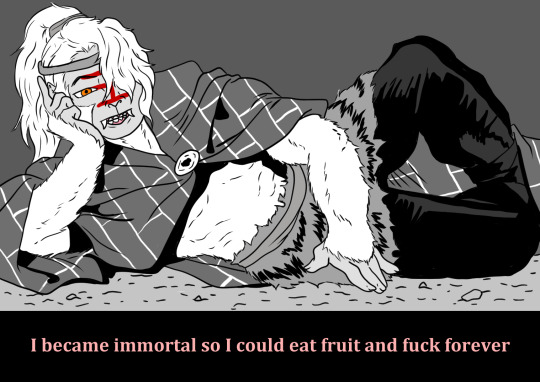
#zaju#sun wukong#sun xingzhe#journey to the west#jttw#xiyouji#kind of wild how much the figure of tang sanzang's monkey protector has changed over the centuries#but then again that is true with the figure of the monk himself#and again warning for the crudeness#because is SWK is completely uninterested in sex#SXG is like the exact opposite#homgmei sun even proposes that most of SXG's less virtuous traits were simply grafted onto Zhu Bajie in Wu Cheng'en's version aetewasf#anon answered
33 notes
·
View notes
Text
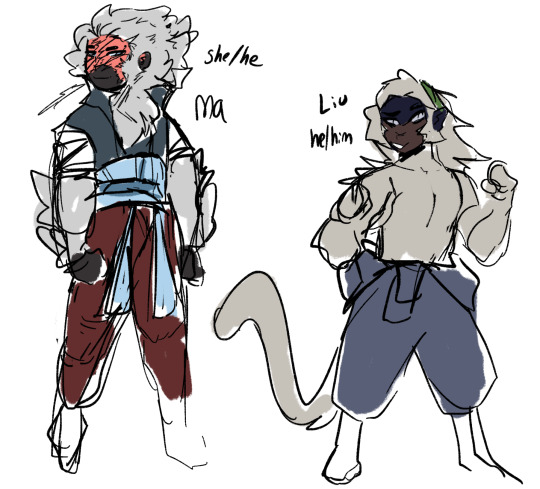
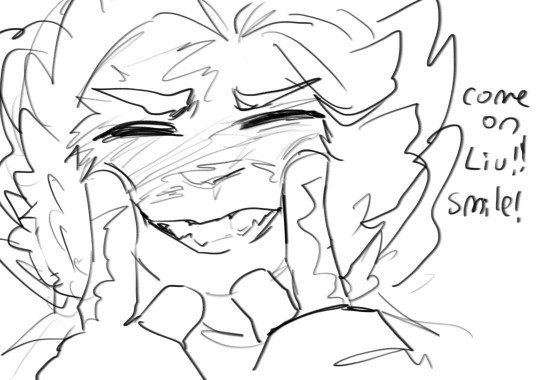
Marshal Ma and Marshal Liu
Buckle Up Buttercups this one’s gonna be long
——————
Soot was a sort-of leader for the small monkey troop, making sure that the smaller monkeys were safe and taking a liking to one of the youngest monkeys, Snow. She was welcoming to a little monkey that joined them, claiming to have been born from a stone and nicknamed him "Pebbles" because of it, much to the younger monkey's dislike. She cared and raised for the majority of the group and introduced Pebbles to two other gibbons, pleasantly surprised to find the three of them wrestling contently.
Snow was shy to join the other three monkeys so he spent his time alone with Soot, clinging to her and actively acting as if he were her own son, giggling quietly and burying his face in her fur when she played with him or when the other monkeys said hi to them.
Langur and Wu (Horse) were the eldest of the monkeys involved in the troop, tending to the younger ones and looking after Ma with the most care, finding her to be a good role for leading them—that is until they witnessed this smaller monkey's eyes for the first time, Wu finding extreme interest in the cub and picking him up. The two elders left and came back, telling them all a story about the river that ran through the mountains and, according to story, led to a big cave filled with fruits and treasures, to which Pebbles found great interest in and.. well we know what happened afterwards.
Marshal Ma (Soot) was named after Sun Wukong became king of Flower Fruit Mountain, not a trace of jealousy nor disdain for the younger monkey, a big grin on her face despite the worry that edged up in her chest. She was worried, rightfully so, for while Wukong wasn't a bad cub.. he was prone to impulsive actions, prompting the young Marshal to suggest giving Wukong advisors and two other generals. Wukong collected the two gibbons, Ba and Beng, and asked Langur and Wu Zhiqi to train them alongside Ma
Liu (Snow) was chosen through Ma's suggestion and Wukong merely stared at the demon monkey before accepting.
The five of them became rather close, Sun Wukong finding comfort in laying back against Ba and adventuring as far as the river would take them with Beng.. but he could never quite get close to Liu, the younger monkey always keeping at a distance from his King and smiling politely in his presence. He was nice, at least, so Wukong always smiled back.
That is, however, until Ma got her scars—the upper half of her face was ripped off and the demons that got away were lost track of. After Wu took finished bandaging her up, they informed the others that the injuries in her eyes wouldn't properly heal. And through Langur's.. polite suggestion, Wukong considers about Ma's marshal status as the monkey heals. When Liu overhears this he worries that Ma will lose her position as Marshal and sets of to find the demons that attacked her.
This ends up Liu coming back, heavily injured but claiming to have been victorious in avenging Ma, much to the monkey's horror, Beng rushing to grab Wukong and the entirety of the troop promptly mourned the loss of Liu, the white monkey unable to make it before Wu and Langur got there in time to heal him. This makes Wukong question mortality.. and.. well.
In the planning of what to do in replacement for Liu, Beng and Ba are watching Wukong pace back and forth, trying to keep calm and coming up with weak solutions that he shuts down instantly because he knows they won't work and he knows that, even though Ma is very much capable of handling herself with or without her eyesight it'll still be difficult for her to fight and he doesn't want her to push herself with the risk of further worsening her injuries.
Wukong asks for some time alone to think and Beng and Ba leave him to it, the latter squeezing Wukong's shoulders and says, "Whatever you decide, my king, we will support you," and Wukong smiles at her and they don't see it fall the instant they're out of his sight.. and they definitely don't see Langur and Wu come to give Wukong.. a piece of knowledge.
As Beng and Ba walk through the forest, trying to clear their minds off of the recent events in comforting each other, Beng notices that there's blood marks closer and closer to the border of the waterfall, to which the two generals decide to split and investigate. While Ba is searching on her side, she bumps into Ma, the gibbon surprised to see the Marshal up on her feet but the older monkey reassures her she's just getting used to having no eyesight and leans against her for support at the suggestion—
And then Beng is promptly thrown into a bush nearby, sword coming right after him quickly. The gibbons hacks, wiping blood from his mouth and tsks, "We got company," gesturing towards the direction in which he was thrown.. and the two other demons take their positions, Ba's weapon at the ready..
That is.. until she sees exactly who comes into the light.. they did not expect to see another demon monkey, this one with pitch black fur and vibrant purple markings along side it's hands and face. Ba quickly tells Ma to watch her ground and a fight ensues between the three and the new demon.
Wukong talks with Langur, rubbing his face and, again, prompting, "So the Buddhas, the gods and the immortals can surpass death, yes?"
"Correct."
"So we aren't immortal?" Wukong asks, gesturing to the entirety of the room as if the entire troop was in the small space with them. "I'm.. what? Roughly thirty years old and I still haven't grown as much as the other monkeys."
"Ah, that," Wu chirps, taking a seat next to Langur, "That's cause of your birth."
"My bi—"
"My King!" Wukong and the elder monkeys snap their heads up, staring at the monkey that comes in, chirping franctically while trying to catch its breath. They swallow and point in the direction of which they came, "It's—We have an intruder and the Generals—"
Wukong leaves before they can finish the sentence.
Ba rolls out of the way of an incoming attack, wincing when the ground presses against her injured leg, but the black demon doesn't seem to sympathize with her, instead lunging forwards and nearly landing another hit on her if not for Beng's interference. It's a long, tiring fight of cat and mouse, the other monkey not giving up easily even at the kicks and punches thrown his way.
The fight doesn't end up Ma's on her back, crying out from pain and Wukong's landed a clean hit into the dark furred demon's face, sending the latter into the ground and pining him down, making sure to restrain his arms and legs.
"Everyone alright?"
"Barely!" Beng shouts, helping Ba and Ma to their feet, "Fucker's strong!"
Wukong flicks his eyes back down to the demon. The black furred monkey hisses at him. Wukong hisses back, eyes glaring down at the demon and he watches mixed emotions flash through those yellow, purple eyes before settling on a glare.
After a brief very loud discussion, Beng, Ba and Ma agree to take the monkey to Langur and Wu...
The Monkey King is convinced of letting the monkey train with them.
Ma volunteers as his mentor.
When Wukong prepares to leave to go train with ba and beng, Ma stops him and says, "My King! I would like you to meet, Liu'er Mihou."
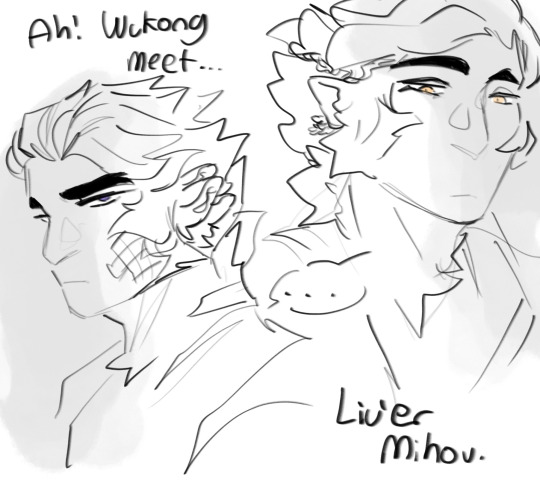
"...Liu'er?" Wukong asks, raising a brow at the black furred demon.
With a scoff, Liu'er drops his glamour, a quick wave of purple magic that comes and goes just as quickly. Wukong stares, slightly wide-eyed before blinking and, as happily as he could muster in that moment, says, "Welcome to Flower Fruit Mountain, Liu'er Mihou."
—————
[Some additional notes]
Ba and Beng cared for Liu as if he were their little brother, in a sense. He was eager and enthusiastic to be training with them and Beng kept cheering him up when he couldn’t perfect a move (watched in silence when Macaque did it easily) and even offered to help him train at times; Ba was gentle with him, once or twice manage to pick him up and carry him around, chuckling softly when he excitedly told her about strategies for the King to use (they were always defensive, Macaque’s were offensive)
Their death was a stab in the heart; it hurt them both so much but they didn’t even notice how much until Wukong asked Ma if she would like to hold a memorial for him, a funeral, if she wanted to keep his things or get rid of them — Ba hurriedly, out of that cool and calm personality, asked Wukong if she could keep one thing just one thing and it was Liu’s red scarf.
Wukong dismissed Ba and Beng from their positions to mourn and when Beng opposed, claiming that he was fine—
“You haven’t slept properly in days, Beng.”
“But I’m—“
“You lost a brother. I’m not cruel enough to make you work when you’re still hurt. When you can properly hold your sword without trembling.. come back. Please. You’re hurting.”
They spent so much time going through grief and then Macaque appears.. and Ba tells herself, out loud, that it’s not a blessing and that it’s not a gift and it doesn’t matter that Macaque has a similar hue to Liu’s own eyes because it’s darker and dangerous and..
And she doesn’t know why she wants to reach out and fix his fur for him.
In turn, Macaque isn’t as gentle as his predecessor was: he’s brash and doesn’t hesitate to jump into fights, he cackles instead of laughing quietly and his smile is wicked. I believe he has a blast, proving them how much different he was from the former Marshal—how much better of a general he will be
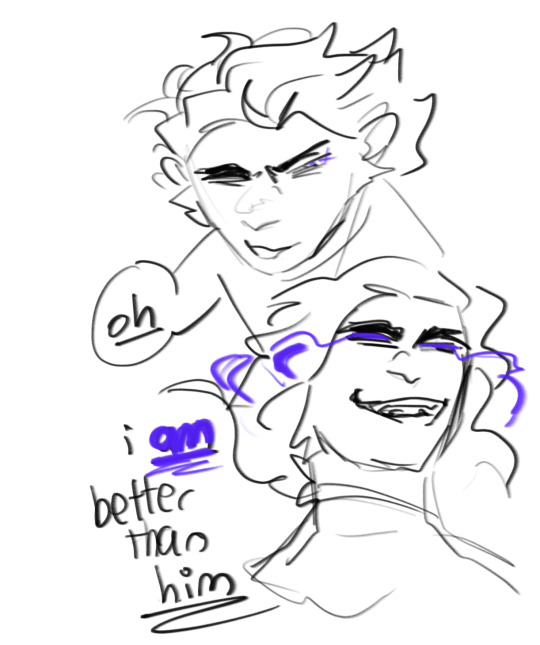
#lego monkie kid#marshal ma#marshal liu#macaque#liu er mihou#of beasts and monsters#⚡️#burning masks#🌹#🥀
236 notes
·
View notes